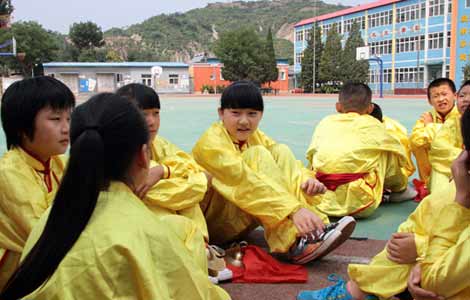Children pay the heaviest price
Updated: 2013-09-02 09:46
By Cesar Chelala (China Daily)
|
|||||||||||

The number of Syrian children affected by the brutal civil war ravaging their country is truly disheartening. According to UN agencies, 1 million children, 75 percent of them below 11 years, have fled their country since the conflict began in March 2011. "This one millionth child refugee is not just another number. This is a real child ripped from home, maybe even from a family, facing horrors we can only begin to comprehend," said a grim Anthony Lake, executive director of the UN Children's Fund, or UNICEF.
The children's sufferings don't end here, however. Apart from the 1 million who have been forced to flee, 2 million others have been displaced within Syria, making this one of the most serious humanitarian crisis today.
The children's nightmarish situation is just a reflection of the wider conflict in their country, which so far has cost the lives of 100,000 people. Syrians of all faiths have been fleeing to Lebanon, Jordan, Turkey, Iraq, Egypt and, increasingly, to North Africa and Europe. As a result, they have overburdened those countries' and regions' health and social services. As UN High Commissioner for Refugees Antonio Guterres said: "The youth of Syria are losing their homes, their family members and their future."
Continuing the education of this mobile population of children is an almost impossible task. Few among them have been able to continue their education or receive psychological counseling. Many fear these children have become part of a "lost generation" and will not be able to contribute their knowledge for their country's development.
Educational problems are frequent not only among the children who remain in Syria, but also among those now living in other countries. A study conducted by CARE, a leading humanitarian organization, in Jordan found that more than 60 percent of Syrian school-age children are not attending classes despite the availability of free schooling, which reflects the problems of integration into another country's social milieu. What makes this situation particularly serious is that the longer the children stay out of school, the more difficult it will be for them to return.
Related Stories
Chinese public more familiar with human rights: report 2013-08-21 21:20
Syria situation 2013-08-31 08:15
Obama makes case for punishing Syria over gas attack 2013-08-29 09:13
Obama says no decision made on Syria 2013-08-29 10:26
Today's Top News
Trending news across China, Sept 2
France not to act alone on Syria: minister
Experts: US unwise to wage war on Assad
Eurasian nations focus on Net
Merkel in TV debate with rival
Manufacturing sees quick expansion
Sowing the seeds of sustained growth
SASAC head in graft probe
Hot Topics
Lunar probe , China growth forecasts, Emission rules get tougher, China seen through 'colored lens', International board,
Editor's Picks

|

|

|

|

|

|





